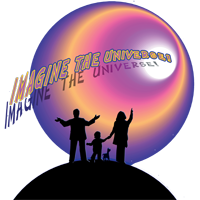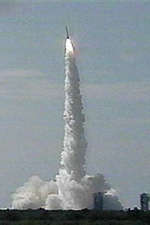Profile: Dr. Eric Christian

Biography
Eric was born in New Jersey (or for Joe Piscipo fans: Joisey, Exit 19) in November 1960. Although he had always been interested in math and science, having a great high school Physics teacher really helped him clarify what he was going to be. He met his wife, Christine Gallant, in high school, and they were married in 1984. Eric and his wife have a son and daughter, Stephen and Lyta. No pets at the moment; two children keep them busy enough.
Eric did his undergraduate work at University of Pennsylvania (Not Penn State!) in Philadelphia and got his start doing cosmic ray research at the Homestake Deep Underground Muon and Neutrino Detector. He graduated from Penn in 1982 with an Honors major in Physics, another major in Astronomy, and a minor in Computer Science.
Graduate work took him to the California Institute of Technology in sunny Pasadena. There he worked in the Space Radiation Laboratory with Dr. Edward Stone as his thesis advisor. His research focused on balloon-borne cosmic ray experiments and the Cosmic Ray Subsystem of the Voyager deep space probes. His thesis presented the first firm "Evidence for Anomalous Cosmic Ray Hydrogen", and he graduated in 1989.
» Tell me more about anomalous cosmic ray hydrogen
Ever since then, he's been at NASA-Goddard in the High Energy Cosmic Ray group, working on contract for the Universities Research Science Associates on various balloon-borne and spacecraft instruments. Recently, the majority of his time has been spent as Deputy Project Scientist on the Advanced Composition Explorer (ACE) which launched from Cape Canaveral, Florida on a Delta II rocket in August 1997. Observations from ACE will help scientists understand what elements and what isotopes matter is made of and where the elements came from.
» What does a USRA contractor do at NASA's Goddard Space Flight Center?
Scientific Interests
Eric's scientific interests revolve around the formation and evolution of matter in the Universe. Cosmic rays give us one of our few direct sources of material from outside the solar system. His primary observational interest is in galactic cosmic ray isotopic composition and cosmic ray antimatter. He is also interested in cosmic rays from the solar system, called anomalous cosmic rays, solar modulation of cosmic rays (the solar wind blows a bubble that keeps out low energy cosmic rays) and a puzzle in solar modulation called the charge-sign asymmetry problem.
» Tell me more about cosmic rays and about the ACE mission!
Typical Day at Work
Eric has a hard time describing a typical day at work because he's working on so many projects that there really isn't a typical day! That is one of the things he likes about this job, there are always new puzzles and challenges to solve. In general, he spends a fair amount of his time writing in one way or another: scientific papers, answering email, web page design, programming for data analysis, paperwork for the ACE spacecraft, proposals for funding, etc.. He also spends a fair amount of time in scientific discussions with other scientists, either in meetings or conference calls. This is where strategies for the design of new instruments and the construction of approved ones, or data analysis from existing experiments are planned out. He also constantly needs to be reading papers and attending talks that describe what other people in the field and related fields are doing and have discovered. Another thing he likes about this job is that he is constantly learning new things.
Questions and Answers
Q: What is the most important technological advance of your lifetime?
A: The most important technological advance that has occurred in my lifetime is definitely the advance of computers. When my son was four years old, he used a computer that was better than the multi-million dollar mainframes of my youth. And I treat as junk computers that were state-of-the-art whiz-bang great stuff just eight years ago. And it looks like the advancement will continue for the near future at least.
Q: If time travel were possible, where and when would you travel to, and why?
A: If time travel were possible, I would definitely travel to the future, not the past (although my first quick answer was "Wall Street before Intel and Microsoft went public!") It's not that I think the past is unimportant or uninteresting, it's just that the future is completely unknown.
Q: What do you like to do on your time off from work?
A: When I'm not at work, my two great interests are my family and nature. My job takes a sizable portion of my waking hours, and I do a lot of travel, so when I'm home, spending time with my family is extremely important. I like working with my hands, and my son helps me with household repairs and construction. I've built him several toys out of wood, a train set and a model Delta II rocket.
I've always had an interest in nature, and love hiking and canoeing. I'm a birdwatcher (still learning, not an expert), and am sometimes a volunteer naturalist at a wildlife refuge (Merkle WR) near here. The traveling I've done for my job has let me see many interesting regions of the world: Australia and Tasmania, South Africa, Ireland, Germany, northern Canada, etc.. I love traveling, although it's harder to take the family with me then it was before Stephen was born.
I enjoy participating in several sports, mostly tennis -- basketball and softball at times, but don't watch sports very often on TV.
Q: Did you have a favorite teacher, someone who had an influence on your life? Who was it and why?
A: My favorite teacher was Neil Wyman, my high school Physics teacher. After I finished his class as a junior, he spent his free period with me my senior year in an independent study, college-level physics class. His interest and help is definitely one of the major reasons I'm a physicist today. I still see him now and then, and have to stop myself from calling him "Mr. Wyman" instead of Neil, which he prefers.
Q: If you weren't an astrophysicist, what would you be?
A: If I weren't a physicist, I would probably have become a scientist of another type. I've been interested in geology, biology, and oceanography and had considered them all at one time or another. But space has always been my prime interest. If I weren't a scientist at all, I probably would be a computer programmer or designer, but in many ways, that's not all that different from what I do. Further afield, I could see myself being a ranger somewhere, since as I've said, nature is one of my main interests.
Publication Date: November, 1997
Updated: November, 2003



